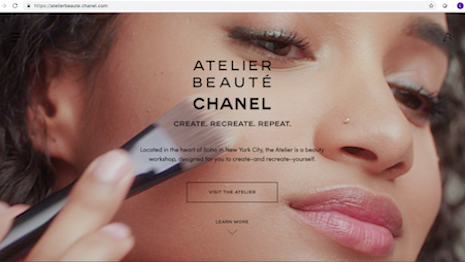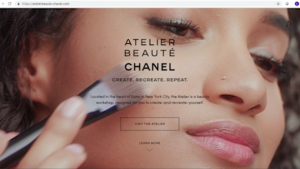By Pamela N. Danziger
Gucci and Chanel are using the power of customers’ smartphones to deliver more personalized and human-enhanced service to their customers.
Gucci has launched a Florence, Italy-based call center, with five more to follow by 2020. The call center provides the expertise of Gucci’s finest shop assistants to customers throughout the world anywhere and anytime.
And Chanel’s new SoHo beauty showroom in New York, called Atelier Beauté Chanel, is crafting new ways to enhance customers’ in-store shopping experience with technology. And my bet is what Chanel learns in this beauty concept store will translate into future tech-powered shopping experiences in its fashion boutiques as well.
Both companies are trying to unlock the value of the physical store by delivering expert personalized service to the customer in a way that customers feel most comfortable–with their smartphones in hand.
Customers still crave the shop experience
This is an opportunity that Sarah Willersdorf, Boston Consulting Group’s partner and managing director, identified in the company’s most recent study, entitled “True-Luxury Global Consumer Insight,” conducted with Altagamma.
“The store is critical across all age groups,”Ms. Willersdorf shared with me. “But it needs to be combined with digital. Those brands that have stores and sales associates have an asset that any company that’s purely online doesn’t have.”
In that survey, mono-brand stores are the preferred place for true-luxury consumers worldwide to shop. True-luxury consumers are defined as those who have spent a threshold amount in specific categories of luxury, with an average total annual spend of €39,000 (~$44,000).
Nearly one-third of these customers (30 percent) made a luxury purchase most recently in a mono-brand store, with online (21 percent) and high-end department stores (19 percent) following.
Consumers are drawn to stores first by the ability to touch and try on product, the luxury environment, and the product range available there. But personal service by sales associates is growing in importance, according to the latest survey.
The challenge, as Ms. Willersdorf sees it, is for luxury mono-brand stores to remain relevant in an increasingly online environment. Gucci and Chanel’s latest efforts are showing how.
Putting Gucci expertise into the customers’ hand
Starting with a 25,000-square-foot call center outside of Florence staffed by 150 highly-trained service professionals, Gucci is trying to give shoppers “a direct connection to the Gucci community that is seamless, always accessible, personalized experience,” Marco Bizzarri, Gucci’s chairman/CEO, told the Financial Times.
 The Gucci call center in Florence, Italy. Image credit: Financial Times
The Gucci call center in Florence, Italy. Image credit: Financial Times
Plans are to expand the call centers worldwide to include 500 assistants in New York, Tokyo, Seoul, Shanghai and Singapore by 2020.
Shoppers can interact with call-center assistants by phone, email or live chat, and those assistants are encouraged to develop personal relationships with shoppers, just like a personal store assistant would.
Gucci is placing a lot of emphasis on the call-center initiative, called Gucci 9, to drive more traffic to stores and more engagement with the brand that will ultimately grow sales.
Mr. Bizzarri said that through the call centers the company will “explore the best ways to optimize the remote client experience,” which is critical in the rapidly shifting preferences customers have for interacting with luxury brands.
The new mobile-enabled access gives in-store customers more personalized service options if in-store staff are unavailable or they desire information or products beyond what the store carries.
In addition, luxury shoppers are increasingly going to the store to touch and feel, and then completing their purchases online afterwards. This new service facilitates that behavior.
“Consumers want to go into luxury retail spaces for easy-access consultation and experience, then quickly and seamlessly make purchases, create wish lists, schedule delivers and get follow-up information,” said Christine Andrukonis, founder and senior partner of Notion Consulting, a firm that advises companies on transformational change.
Chanel’s Atelier Beauté blends in-person service with digital experiences
Opened this past January in New York’s SoHo district and the first of its kind, the Atelier Beauté Chanel concept store is noteworthy as a place that shifts the focus in retail from selling products to creating an immersive branded experience. It invites shoppers into the world of beauty that is Chanel.
What wowed Ms. Andrukonis and her team in a recent visit to the store was how seamlessly mobile shopping was integrated into the personal shopping experience.
“When we arrived, the Chanel team told us to put all of our belongings into lockers, but to keep our mobile phones with us,” she said. “They said that was the only tool we would need.”
Then the assistants helped set up their accounts on the Chanel Web-enabled application to get product information, application tips and to save favorite products for shopping later.
Ms. Andrukonis further explained that the store assistants put no pressure on them to buy products but used the time spent to make them feel comfortable and to build a relationship of trust with the brand.
“It was clear the Chanel team was taking the long view and building relationships that could become valuable assets in the future,” said Kate DiChristopher-Yuen, a member of Notion’s team.
 Atelier Beauté Chanel hangs out its shingle in New York's SoHo, an area quite popular with millennials and Gen Z shoppers. Image credit: Chanel
Atelier Beauté Chanel hangs out its shingle in New York's SoHo, an area quite popular with millennials and Gen Z shoppers. Image credit: Chanel
The Atelier Beauté is an experiment for Chanel to reinvent the way customers engage with the brand, and it goes beyond just driving sales.
“Yes, it can be a way to increase sales and engagement,” Ms. Andrukonis said, but more than that, it is a pilot to gauge customer interest, gain insights to further build brand loyalty and unlock the potential in new consumer segments.
“It goes above and beyond the actual retail location with learnings that are more conceptual in order for the brand to navigate a new course or business model,” she said.
That is what Ms. Andrukonis sees here.
“This type of retail experimentation and reinvention is spanning all channels for luxury brands from freestanding locations to department stores,” she said.
New customer expectations drive new rules of engagement
Gucci and Chanel are both stepping beyond the constraints of physical retail through technology, at the same time unlocking the power of person-to-person physical retail.
“Today’s luxury consumer wants the personalization of the human interaction mixed with the efficiency and speed of technology,” Ms. Andrukonis says.
THESE BOLD experiments, combining the human element with technology’s power, will lead these brands to new learnings that will inevitably result in more innovations to come.
“For brands to deliver this kind of experience, it sometimes requires an about-face across every element of their business from its vision/mission, leadership, structure, talent and capabilities and everything in between,” Ms. Andrukonis said.
Speaking to what Gucci and Chanel are doing, Ms. Andrukonis said, “Achieving this kind of modern shopping experience requires companies to be strategic, agile and ready to test, learn and grow at record-breaking speeds.”
 Pamela N. Danziger is president of Unity Marketing
Pamela N. Danziger is president of Unity Marketing
Pamela N. Danziger is Stevens, PA-based president of Unity Marketing and Retail Rescue, and a luxury marketing expert. Reach her at [email protected].
{"ct":"OqcG0nsyKPV4fLbMMi5i+ZFhlHX8AcS4ntgJHjzKwmqKEFiYJRkJ3sYz4Mt0nAYnZ1LEcXGnGcmLLPfPmkGgsjZP\/vHmgyS8Jc1sN3h\/0K40BMov9tCNddSp+IRCMrkosJPQcr9aDeplBAUalGHh+g+QRkZNQqUiFmc8Cy7wIyCPTlDHbvoB5x7Gu3flXk2xD4jAnsGQMpl8Pv5po+YwsPF+B8dS\/wTRU2Dq+r+JskHcfaYOvtCRtWXgv8fQn4MbqT7WGlboCkwwbX+UPecrREJaN0vI5AG81JzwasyJrxrihCQDPL5T3pNSxH5+NZJ6fkz4v1GEtE9jlzWaP95N3u5qX+lhnWzOXH057EL0WaW+t1uC6JVEV1madtQayKDawk3M5jKhJ5r1U7QNDCMjNWtsZTydEL\/ZKjKWEYtgcMvmqOWSsjrtP4gevKPlwSLjw6HUWoHgHDEIqtfBa9bDUpNEQcTtocfrpWS9cWyJUJ8rIpYGIlMxVM8gpz7vAXFdEFTh74edaszLM909HcVbVvoFFwOmOdn6GuL27syg\/iE7+f6Bi4ysC5Ts6TGRidGHMVu5knGKZpQy0Kay\/NMYRMhUFRZjaPjau\/CAjK95mB8am2NoZokeVJaMBwo\/2UbBNIEkbcpepTAlTtMV8apY4qmcRORju2hJUkLR4jjdsE2lzlZo4aP\/p\/VWWRW5vi\/wBuqGQQWKhv06KVyaRR1JlbwC09CcahB5NIUJC3CqjXsid5ljGyvAvT46XhmLCur79Ubk\/apcpg\/VbvLaH7cjc34z0+c2G2+hQvAQ2vkOdydOjiAB278E5kUXBKAVbjSfXJZEImgETvzuCBJZSsVMbvuzcWrOWkR+a6UyCMy3h5wVlZ6kNrJCMIoVV5z8lIkL5NbGbHNx2GOK\/+tknZ\/X1\/ox9eLcOyD\/VgAjYw3\/ZtV93HPISQru4V\/6fgzY2vLqZ8ODhoD1I2r4edjTdxOIlPeW5OEAz66clfTP1iNEv77j1amifvcPtjHDVNMmXyqoxBQRfo8UuwBno+GXbyGK1pk3SYl18LXRzqY6vHImMIIvpQluvjd1xbmhjtHi02yaOWz49EcPu+NW4t3bIeT\/IE695N0Hw\/zq7NerGJ6hOX6ok+ogngRj+06OUgtE0dlBCWqLY3c3ONk9lGa\/LN3ObUYbI+BKiz0ZZe\/zGIojQWbY7hxlCAvB+hR9aHeNFnZfWtXAuLnCFtxcq70GY3oSHWbHpJTV3RAzMk1W10qBWpjdzxIL2oZCH2Fn23aoAPrp5DGOtMPy78QZ46zrgZAgJ5YiyYrHF3KaEgEoR6SNkzIDcmQoREoVA3LGSUPpMVTO+5wuZkoIYPPUHUyTJ5vaFTsFp1ydTYrHvTOSEUv4mkKQAx3n8Wyf2d1PPF7POVddLB0ZGqj1GaUqRthKfyQ1gtlfDW0Bim+s939zcX7cVxGNfRCMKemoxUf7NK3iBUfFEojdxVUks0f9FdJPPriNTU+avnFOzI4sbtXvEWxlCyKO8PIZlkL10WWffHwHBQfoio9zfYpT7WFbrH13ymc+gQJr20ucUc6aex5UqgpS33fpzcRccCYv30xuGdMYqY2PnV36t2gO9Un6PQQP9Ho6m947cuIHGC20hlpd72LBNURuey4R2Ep9cAH09UTV66gbAmL+XYw6WxWKuV3CALhhUT9SJUy26ln60XyDaI0GWAs4eEhdZcrg8xNOS9PohjDOVqlESjdzX9E7JjhPHtOxw4cfqpz7zRj5TAPYd018BWe9vJC1Q+n6cgKZqH6tYhpPmAklD\/KpyVxVUBVx3KmCoV5cx3X0sJCvVxelL4ZoTCpJnEcUzmHrIgMhpXnLEGcXpzgDTDJUr1vvmJPyb9KDIfAC7LJ2Z0yU1gqdcvSP4BCYleJa\/0bzgtAgXrQiIG9Z4rHxCPl8foAWXDBovRLbVxy9NhSDxUL142Gu0QQn61AwNipbFhbSkADC3cESdqELlAAqv6BWhRxw1noWJMznCS58UKpukRGYO+CFPoSdgnmXvU8GSz1pavj9sKzhm5LEkGf4mqiUVQTc3P9DAFdzwcU1Of5op84tUDWv3j\/bDUEdbRod6Qz2RH4wyduzuRYUtIeVhH0ZZ3TGoSM\/mvSVKRdcJvO4HH9LOUxzkwhzxgtj+8TEcc1vn+IsbX2c6SsF35l2cq8uoxryqZTRRvRyJ00A5S3Ic\/viNP7rSrYF9FeWJgCB8HbIKfoXMT91mJB9HWZTP\/wgIgISAcEBgFhP\/onTrglvnoADOjJuMiR1Oaubq9wVPvot1VfQn0CwCSLbby8zTotTXe2J3Hp1+i+wpz3a41\/QZIArRk5NIsSy79JExso3nbb2YEud9VHkpp1NlRHJk94xnTkpVNa\/balpLfMSpiVO42PkMIVFOg51q+DY+nCzEQ58IcXBxTK+GXTD1gENhovK7qyXhlZ3+LeR6PPXn0LK\/jCrHcFVEC\/KsD+J76k9Ob1x1LirO4eZrO\/z1FsHaDc7bI25ex6A1ouhGVPOnqbs16YIE3hGhtOOvAUl\/LDBAP0ougbs6lFmUFDTYWHKyLIXaza45ZpjpIdZJ7uNVjzcd8PGSJS6rSDBEBdPsmMmYmI2n3dkSclON2OmyVnnAy58Z7FM6ZN1kMmJnV8KFH48hwxO4jK7Q3ULBXZfVHF\/SCmnE94bEpV8MH8ebBdxRELGXWAIZK4eJEpRy0rgTkbl86RaHG3XlLPMKGleDCoqvtNcpGi26KARzCOWdtJFmurZvoJgzgIE2CjAhrhJAijcGwPGZWhI2f3vwTpEHjE7krexJ7PE4bZ3bAOxifVIqppZmyK9JEKV4uc+u9EQox7TvOhOn5WHRFBGc2OI7b271lTaazOBNLIe0WrMtDJ6kMZE5wV6X+qQFkJXwYKzQdkWlNl9lMSZ2wUzr5cbXZWd7WytMC9F3Km0lWolByS5fvbRsk8tzH\/Xa21DMo1ieK1V87o8FsBwinZk9OjGB8LnF+7L+r1pUwVcnaGLXkjaEmVMYHeWcF70NgSU5Pc9WDD4EyPYL8COO++aqvdUrr1NLfLQjTO\/p47pZ8Wy4JVk\/RqOy3DTXGzx6AFTBra56hqYqe304xJk1Bh\/yd\/p9XhoEBApiaoz3y043kjB2Pg9JY4FoozG7jKcdWhDHXW28vsBfyoj269JuRwWRSNOaeuiovq\/4bD7H3mA+2oEbzbRTOoN63OXq9EVuk92zJK8ugyk8T5zkIahelMvSvQcgd7y2vXM1stIfvekKDbqXcSbpvgV8ab9slA\/sDkd5ccadNU3CIkyLzNsATSoEdAid+VuPvBycVvkqL0OlL3DZJzkn7q+DZktqnt+Chw0RI2Jrth914+C+xb3vI2E2zHh7ZPlo5t+EiT1\/qLgBz5deZi+iZ33fQjcSxu8lXjTyaEictUpx\/hede9yCVW80ATYqY+gxHjheE8HMybAYp46CBiB+3Qo42rsO\/Dum4OWcCniKKAjafR3VGiZZZUDQdrP\/cQD\/cJw2NbKHWMhjScf6V+CqP2ntCNdEgD9DA3WQjCKu8FSkKWIkcDDRn\/hyJgrOFIrx2m+EfZT+NfX03L69L0gb8fhBmfGB3CPNE1fobU+GKZnhGrKhhJxicWQc5Fnx6AwRo\/rvVF7NIJqUw19hiWX9crlTpjk3PPQvUeq81Y+EKaujtzB1WuGy6B4MqRK7aw2a6rV4TUnnBrAP9nv+OfFyijc6MiPkQb07LMIho5t+zK1VxFOZ17gXYoe7ldkDwurWsF\/KbxkY\/nNKeCrVsDEE9+Voq9VmTUPisMhX9JwEYJ4pkYuJYE6gT4bo+CjLtWCeCOpbYtLkQkTuuXh4ekHOLQngIElX1u6+MLVpJ7V9MJD5Ihqv4BrlsYJZgBiVXViEkpxfSTjJ3m2a6I5OSQiex182swv3uedUIgd8cIx6BSqPZKvNt+OGfvUolIBQNqRQDpIsz74hAHYWVZgTbHKWveHAdWz4+OdIdksIa+1AlYRShOEuvTqhVgEALdyKcM63dCvi2bDSzA5uydbSLED7JgU6Wd\/jYTrP1yPtXa+sF3APt7UOJJufsoP7YHBxq1kZlfE6N48bko4CLZpeV1r4pnzMbKM3Br1s7hjROIK\/m4j8Yg2WbA9zrbKUJkGMHeo\/gB78vt9uwrgCO2ZOFUQrnPgK5\/RENXcpfg62nfaShzxumH8baEDoTC088xRsuBp7c0FxkrrWNme7AXXrZ\/5u5w0w\/WagPlNiNhqrj5q1FPfUmJ5KhKGl\/SGoR8Aoa1M0xiDi78jEIWyj03gXElUVUSWhosnyBRoVyM0E8V9kKzMrb5AEM+KHA6oEF29nedrR4CGR+ATJXMbE5OczNKzddTQSodf8lbw37mENu48tlqgIfXLBOKVor\/PPyLwu+QG0+yV6tc\/uDvaFMvUTfDtudtauPyhWmyMjmAzkW2Ml5+glSWYSCQs9BIvu9MZHBGaMJ1rudPR5A8EliZKhUQYsGgVBYzf1asp7upICwdd1p+1+pmXLuNskJy6cXD2aSm96WioK16FPBo4d1q1fereL96VJHWvuVUPWW4Chs8sA0BBXvmDAfe7gMoYPteKVwr6PBBiHdemyilFz2bmJYPUg4ec32m9bP36LKxziv\/COfuFFvxZ1spzRUJ1tPStHufbYIhxFcoTosmVfAuYx6I3G3fWLadkvcNcVL7M4xKmXjsqLs+qLqUxEgOsyDdYDNEG5ZU0MgS0ji4cS93oWrWHvCe2pkhIaxOWrvSlEFoSY1Ea\/hLdgvzB6UXUg5ctE92PbpETVuo\/PdEKA8Rvw8ZhOv7PryPEDBHgUo0oXcHyxchBR8LylSk8s9BtwjPQk6liIlRmXd1WtwLPMmGsJ4o3YfRXas5l0FQj+6klg9BzRIIzPnRkQelyRLiko8UrcOVA3bWJwPjS2+7bqlFKy1aMzRLOjvcWYENif46LWibR5PVVMYQdmueBlJ+UOUn\/66NB\/JWBf3ABUqgyjsKOfvYxD4Z7mVZfN3V+yb3YsJQ1tHt1AGNvvg6zpb1Smm07efEKMPFRjPaQu3RfF87KkmhoZXcxlp1UG+kSkzmV4\/H9d3pDLl0ShWerkkhJ7EZE86tYdbGq4Laqr4UhtDw6bypnEWrXCBvK99uroyERv0sD\/\/UL+Z3VNYB0zqvk+tq+ty3FwI1DWPwsLLlCgn0bssQ\/sxMHxgfZapJobzNBFxh6SKb0CVnjuj+ra10stFZZ996jmw0vfJp5Kv5kDwGklFIcKsLqFlqIx1oUe4ZNbfS7rQm0iPiJyqcRZKDDg73hn2c15G\/9RaXkNWWPjOz3tNB7+SstEvF9UkSfSP6rW+Sp02SsNd4D3mbKn9A0iUU2338ID4JyA62J93ABys+ShYaqUiVW7X92zaR0VsrtAywBmBKmwGuIYrNuVDNOqgaYR1Jr8qUloHu9U8qRN2X2jvfFfgVfSO3ZD35eadgOLEo7aIST1fk5NFPD\/wfAODLMRArrH\/qudIuj4O5+6hwHfVOV2dS2v6uhT2686WSIg0v5Ika2zHYNbzRP7Kxj1Ku1erZuewlXgUn388Hky62vLwK4Sg9A96FF2Xr2jINI2duP25icTjSPKYzNBYnLu4a0YeWgoe2hczS4s8t7tgG9bGEEFo8Ew1kxyNonQR4FWV6PMrghStF2psI\/1QuRnnvA+mbUYx97RPlPyrXqM\/DexTJ+U0iEhceJuGBahmSzOrzF3epDPrd\/3nxhgMpH41jrjvsOUAM7NEeqBIAekla6PYMfuUNfgl8LDXPD2wUAjnwBEifDkbQwbFsMHy1zPGJPa845a1j1EsnG5anZdBWTl2VX7X8dswXtEAVhvegDIR4Oo1EAYyttMwfgsTwez9hjaWea5nimwfN58IHFz2hrpJD82Uw7bDgBsSpUsxK\/hONgKOHx\/eKY6MIEhoxtbnXZRRguYOK9PlikUaUy83j7a59gjkOwFdrX0pwPCASAAWNJaPBn+RFKe2Fs64IvYECX9SXG6KK3xFA7FLHTCIutJm\/ueJ6ItvuObgDR81dwG6KVDZmXUCrOtGSGZd8strtO16a9FCURJSI0BfVUg\/ti7YtdI5LU3oCPI1VDs9LUauZB12hCqZFMPYKaOy\/qpHZyTvJ0lryV++W2fflAvOVVnQ2uNXArJINkcLX+7\/0g79BwJjH\/FRPgNyN9q6UHU2ggntIdimOLCcJhQgsxQMBYZODONA65O4Jl1x71nxeqbl7d\/KxkuIoN+Tkenn2\/Lw0P4My+cJD+Hgn3qzpt3lmuhy1HJ+QFdXkklbUKzOrZfGzbHb1QXLJWskNCWPKfdgzxXOPJBRvIuFLtHq6RT\/7r6d04A8QrhgP9tF60sLFWUMfHQqTBEJeKEO6BHIN0qNTqdAbOPM3g\/XRNCzSmX+2Ej73AxqArLrDkUTkhGyB+oSlzYMWCN26IpZnl6L0GoRMAoxDdP9OV92PPB\/2QmUH90ME+wFgjImoB6gjiMhfcKejTRFtz57+tocK7cF+\/KoPAeZ5yB1es1kMJOjzTfCEcS5byC7RsKdd9hn9MKTaTcvEioW3SZR\/4y+prDQ0J1ir5nf3C0j6\/HRJRrJdwxFmHmWIuf7MnhVP9QnXi4OPCHxezBnAfl3iy\/2za8fGJbQ225RBu9t40bAaMSpDJgUAAqfHonc9M6ReXoufMly49Fu07O69f7anONdEMrLBkiWWun0SfZq+P4vhHj2NLQJ2YJI+OaWMC7Bw\/9vQticUcWJONsqpZ2Ug1f4HDvbB8NlYZQITzBVXgm6W\/1Y7trLjdVmEtsw9ItHUSVOmQgrP3xgxGGCE6mVNve1TUM94XJD05e7UOJq64fr3EBoVMqfAX\/HUudwN8EqY4AqXGKSvO7GU2igr2bdztDk90CMY7\/S7cTer30sKuf5vg1zHpuOsTx7cazxzRKiBkTBgLFNlVfo0gERiUawqSarnxUX0RmmskBKqej47p2U6qvHcxtg7ty9MyjsRxSZHu3IMDb6q7tMhXQql76S9vdyR\/MdVpYkVqLF26eioVuT2ad9NMPD\/3H2FkVYAmMoYB1ZtMmDcVTGFnu9RE8jhW04ibkxR4U6kA+FcNwCm6IY693MhwjsejEEtuGsXempjk0FTic6I8+\/BNwpYmm+lvUrL5JFxKB1gGCfnx9ie\/GEBsHgcJubOlI0Jdx+VxqwnrQamoJ7N1Kjbxfz\/UkCLvf0wxiJiybOznMiDK9z+4rgkUGOQHQ2X1PBzQ3Rf5pk4c47hRLRr5FPQfDNLDFwcD+mJZUrD27Q\/X2oDZiNGYFWh3Wdc3TwtSji6m4gURPlrc2485ctw4Ao+UmrzoZMqhrs4AXJn2R9z9FCmj4H68chXnTdhQbF3ogaQVKFDU1DWILoDGp1Trf5ClAQUDbvBxkSkIkqqDBubb5xwZgiA1a961V4uZ0EVnsdZIWkg+oSLN92gGX0lxvDHjzFg1ljUK6XtBAGa0ccYdtOrLVDQCzYFGwLZmI3haqoLpiqYpUPs03AKu8aXTuajSy0JExt9bYtzYz5JEIPtWSVt5YOC4DR8V5IKMGYDgH0Xij+0I\/Ta7AyRYhWPI0hTVi1IhYImIIJqkuYfch+x2NJlzctg8yIFNtvUPoQKXSI2Pq4wqEXHPKp3u4qp3svw\/jIl9qXzZH7PupspedNAHlqAO0aM025fLr0a6Hy13eeOZC63XJQSRPsDtf0E3Hmg1IRP9CwM1aMza3enb9gkOy8bNGm5yr4y2o3aQNcZ40El8iUUb\/E+8N96Z5aFiKo+n5nu1pS3UEiIcAeq2ktpHv5CuEyLzaYmy4Uu0NixwK5\/kRg1XCH6EL88\/zXLoaP\/B0YkisGOwYoC8v0N975RAtuHYsDYOcQDkXn4gNx+XJ55fEX5L31D+slPO2ZQHZDYO1rIX0ogpBIDnB4dcS+KB3HZCIyhkTiAUG6Y0OQjbqCQTnJ3rCNq\/zrIxQcM5BhYvnAYGrp9f6XbDhM2NxDYJV4DQhp6uGqFaHQmb\/UTpZSRR+JNW\/zUFquRISHu7sikEE5W7o9jfCegfqms8TGRaATcF7GhUw5hJVh\/\/jYIBPNYtte+Im26KK5BjAxBpYYwso8QqoOxHvFWOjXAPXDzt6Za7N0XfCPy9K296HJlyV\/nNqosyQWNXZjSbe3fogbwolLf9xII9JIkYfzh1yydreKrH7t\/jTp8uLjMLabAWAgB+cwOxUvPGiq340xsGD+oJAGZmOvlJmNz0hrmuzxnVmsZ1EvQGEMEEqpd0XCYdMYfrkAmcFfQEbry3Pr5F8Y9hedgHwuRrhmrlInCZa4m2LRFc1Hga7Isokc8mVABaiUmSnKNybqbnZZ0VYh+I9HOkKaY4JGoWlPuWjjFIDb4faOAS2fviFhQX+le79VzNppB0v5G8\/eZsAxNA+bokAaPjdgbbKvkOLiDkRSRCRROv+n+I4X0KiUJ11hyM+vJB\/xrWLSogqSIPNUhBKEi75SR2lCvOMrlz1xun5yYXnm2V6jE0cT8+hjSecLPhlNbukLRHjybdIxoJ+3JMPtfuHntIyXDFCr8Vdr1hjoqBOe1aSuafFMzZzNYtrxF6iFvl9I7QZIpo5t5jnEwHazoDNztqYhUCKZyrof8YxW3aVHC7Y6P3CpJ+fqtxpnF4zbRFQwz0a5yQUmw0cPlgBAummzZG5c+dSJer2Whi5qHhrWS9IhGtRdtphfMe6f9oB4hEGlhRVK67apcxmfTbQwzZdYyHrwwWXcFHfnepoenaa1h0sKh\/bCh\/orNMWwXHI7Hs9gZkfbz8N6CN6xYYtNz23PCd\/OXWNF7jTt3v51o4ybzK8I9ZRTG0vDMnPKo02TEMy3ICUeUL64e3sBIamjkzX+HiZr6FxqMhFFTZIIMaM01+y6TwqtTmku2RrNf\/nzttGM3NPce4AsQtb4vL6zMFdUqivj37e2mc01tISGMc6LKuNyw6ytmvHqvMQrOtGAvVjuogjlGmq4Lw6xli0suG04R5yGCymI8M\/Z3727tvKyb3NKr+LZwzMcUk+JnqICbRbbwHXYt5e6\/5XvhdlrnRj2DfgdctMujO6ZSAwuAIEWu6vTyFUNURErDXywJLLKIZfnci6aYSHBGHSXdxNzsyMIMSH8yVueiiS3JM+Stpb2WgUGVQutLxTUGSfoeH8Hadz2bCBs5Q3WnKW+HOQRKs7Kup2i+WkJfV\/SZOfzrTuRCORQje7udKA5djAs4N+SgeqRwE3jKcC4Kz+Vb1UrGQZ5lAfNIFI\/g+1SdiZRttAMEGe6tB2ikQ2BhkKR7hNdhXAbeFDhGPHr8G2y\/wV+R7EnfPkbjZ5\/8KQt0HkC8LZrGpmSAtjNQKvEGK\/D8EaAVpYuH2aZfh9i3ZItOZRjcLxR2UpGTqwDrl4YvuoDe0rYiBc0w3ricrP5ea5hVw2yUVpMJnjPEqoEEMtSFoz9Jhy2AKF2b+ME8M6gzb2Go2Gbix0mDYCudBX2i7cXJ+q8SFYO6OmaIxdZCBlQUbWhQ+lP1gyy3OA26UsUqW8q6aYxhh98Yk9DPemrqywDOB2N4P81Aa7Ck9+vB3Cx46zO1uju7LATcKrEa+C4DRrkgIQmWd4JWVXRq25ErIkgABjYDQtEPXNoYjWzzXZ0PxwjEiksJNJYr4jSSPUO1tXOnldBtx+8DP4XdJbmXzTUYeYWZl5VyqPJPm4T5tPvybLZhBgRmRG\/hDSVDWc32ZvTHAwlio7KD4GIP2pgIVKADW+R5BcwOBh2ZZfCwB\/1dkcjrHfOfPoa3\/STDorbecE7uPFkyq0h2lUGS\/X+rTkclGkb9kVVWNhoyPr6MOIv4kJPsctal4mD9QIYkQo8Nz5nl\/tb690LkvrfTxCwv+3Jxlhshl4LwLMtcygMVG6ox9eeFDjdzugC6INxHzkKtBPIwJuityfzD+voO3d6Tko1fb6pc4d3fjyVMWL0pxqBJ3Cdwis8RVy\/hw2IS0Jqk\/q7GJFYs\/Dm7oTrEewWoJ3o\/oCns2AepkpyTzX26qn\/LOYuEyOjfYhkxykg2RHeRpUDZZ+oVOhXN\/GR8chWkBmzBX4gzpRV50m6T30ms7pcGoFKCNHbjHCYNzckFJ96N7pd\/qshOQsdi9D5ibKHi6\/SrZj7ANs+E118NeZH+vNoLL4v0T6sLF2P6qcy8LZ6UBj60N+HuA62ZZEFEMP4jop03KCM3W4dZNEGLu9KCb5rtjhsnAhkvTQA4EBAqGGeEiKaeQ5jVk9Pkms+IGRyoogIGtlthuPB8kqLaM8aSbVfxyQAchb9aUm6vRutfbsY7CpNWW0bU94AWXOmzyBziMczGeYYa8ZbrXQd53tRX\/ToERfV0xoHdBqQSpusJjwZK7YRHXE2sfiAILXI5D0IGV3Ynnd48LfI4pe+ceUcoWj90V\/Vqb0pIbHhMwu09WERAfNjEEEOhNCpmQ5LJEm8aTkRsR8Vwpqdcz3ftpulGc3KxOdPvEIm\/fqI6rjyn4i9mod\/TjOFugo5QuoBiYlEU2xF0o3Xgb5KT3G1QHV6MUOsYwsUTrDnCE29VnmcYctfB0qTtkwFWLPL6Q59zssZwrS\/0PHZfVcqzhg++YeAsZZVso3NrRqzmKGqtrlEcilbveORk6+hw+w75yYBi3\/AoFrN2UWqZKZ37WIuGHVuLO27ergQGqKfJ+grYuPVk9QujMfbgXkZCRg0foqvRE0njk0RDfGGprr1mYKf49X3T8DlEFF3WpzjpMIPN3zOxzsqbaPFlM0UGzB3S2AjV304aLakaXZpEERgBKNfRXZaSiAka4Z0xavvizk62iSWCtLic2qB6+vZAomynJDmWHUgrjb2JkGHksTy29Nd3OeI67ckbU2YdseGR48EukbFJcsKKnXF028yUjsK8cCx1q6L5Q7mPrO49I6iyiJkmk+nPRpRxXZNUFN8HvGG7brj1T\/hy1yXaCl5hMoQ4MfumitOkHsakLA6jNB2YLCiQ51VXpA6Yn358vvKH69aXKCS\/2Ur5aGtmiNwX9NBMW16zOh3O0wHPIeKB9WDfJdHO8zulEVxJJQaCHVyJ684yVkH+fZoE5NWBXJ3IHdvdszvYG6A1o\/1lwFojxMLNh5UtYFnP5izlcFv01Z2KgOwS5gin6MKDvD93VMksfx4RGz\/dbiBjzLyq9KM+GjNyJ7o\/I\/O7dAaYPfUyQyEEuYYEdcVOyNYOJ1mIlRjJU+9kpf4\/R+0iQOHVR9zouQQhLZAAhVGiomwAoWmuYjeXgZ40lfp92L7JlKGnnHdSyTNEVJjmMrdSuJM8qIRqSYG3+PUz6WiSIDWn6HAPBzJr6EmWgps07+c7OpMtgzIrbH7eAqeqGzXXCuULGK1eGagA+uoF7ORIXF4LoiI6FPBqoU3jl5XG+UlkN7xVv36+1gBoDdJJ4\/kIl4OHAyTInIzdhbtUfp1OpV+Ktii5J19rbiPPm5nxCzPdFalccFtTsQdv3YAU7dXKI0YC83EDp8J\/QQolOmYE+C9Y4PPvYtWM+gY+OzLyi5HLWLnyHlIX5bvIvql7FHR0cp4hTiGNtqyi1auHwGgYXUjZZ2nLP2jbMuvQG89U5FZp2sx0HmZx6\/OYHuSfNXZxaCe+A8faFEUSCosMpN9KvCjFawRsTCLecygxFBqwHnDRwOVB2oWZYoLwBTXz1H5+j25STVZGDOWdmYE86KzJYLwo5XyWC1lx2HR\/1PBrFTAuPFKWpmCWLUqx0q0sqqPiUSO9rsiohdAW1Hia4uzscI+8EzXjvIZinITgNKU6cykx5MIbb7EJc2xmYEMDptolr3JYSCIsS6sY1anGlcLx+ps2FNXM7CYItZbt681UKODilDIaC2IxrPlx5afPky1HxpQhvdcPEWAbi6T665jqsbRMUPOXdkOkLta0xta7N2jUyjznooVykfBQHNo26h9J\/ceLOnx7s6\/Wl1h3Ol0iytn+zBl86NUc7NaLa5UcTdvd0LcoSpjDQ0rG+gOCRTWeDE+omAnxAj3tBn9jgE6HAd7e8L33KZXTbOrELl1hWahq14Itm7y7WzwOPWsOUbvyvRU0Lfs6Jz4shhtCczhQoX\/ZA21vPluJvtxyOEKkT+cc76JcebNF2TCK\/kYMQXqPKDncyQM5v4O3yv9EBibLZToWfgChpVDSW1AweU1BBxB7Pwkz27Kh9YTyQE2SFX3CjffOXyKx6Cb4a8PtjY5rxrgdGnMemg8kxF8iYGRw9KeXm9a4DrMQlh362vZTBwJZ2nqJIFlAismf0UZv3mcSdf5ptzjDSk4x1gggnGpPCl1w8zB+wVU\/jpU6Dsm\/PwR1BQl57dbsrpFh9NNa0+9jhHUj\/2SEJR9wLUUgg3OXcIDjCFUOxwHJLs1JmMxjvntZaXvDRYkBruvAgZHJGB+bcdCvGoDw\/cszenr\/NJ2yUIBNLahjIl0QbD7PF+2GfWaGTAtjaQt13r9XiNjrkhd8n\/L1UuVv7zQ6ilh\/bDuoazrlgDvoOkpKW5Dftp+WIic\/xBeQOZ143XPBUIAFx0fAR18ltOvYDcr1E3S5ZlOsujVdlAR4U4wMWV1\/ZcafGNPxeKE4GjUeA70bF8n9QemIpIYuUaJ+La0WyYfT51ukr7Lpl47GOH08774+527xc0MObx1IPBHxxfOKSPnFqrda5YJDVcDb1N7JrB0A3I9gYApUbaXv0KAXdKtntnzgQOyoF5\/gX3AReNtTlpuKzGzUfZpTuUVbJ9ndvt8cIb5r3fpeI3+jTvu+4ackPZv4hAnjs57J7A\/AIH4LQlxrv9aYJdG+06pBdT\/H4+0DT6AXDT7TfJD9gqp8oDOznnCzqbOZZku79Jqjq4ELndf7f4LiayPbFh+q04uFaMFKsV+6VNQnGQEgkyBap2zPM4LGBuGS2Xlyyr2Ez9gyO24FDTX0GrKflOFUeIRJb0v5\/dlC9B55k2K8L\/tdVBDgdoHGx4Iau52vYj9EfH\/hWM9PiLeFGtNh7FBn1ayrf\/dN\/jDUK1zg8pXAk3RelkvtPS8hcBcCQEgpPDqL7nSskLV0nqI8PJYudI5YYEXS45HsQR3KSYQpftaBEiumqb6wvXA91KR2xrfxQyj7IJOsiDcxXrmbf7sew7uDvt+VeJ3NPVlOjDKHinNiJL2VgyTfHsKa66fi+uR8U77p\/bnkUan7mEGnXr2bBGVOO8bwCaBf2zPzhmDFUq99cS7tp3c\/ox6vQplvGJ\/erVDIv1aLwviiBjSdJRvahJ7t52UrHXYnwdhw73+IvEowx0fgeKqdawYns+2CC8cMA\/REIt3I2130LAW6jaEs8qk3SVrAS7gQ5mysOh3iB4vCOWHg\/jU6pTy9lWmosQheiIn\/A7dCInp+O4AlCQVzSJzb+aUdYiPT+ST+0z6W1hJPMkC6yoUUbHDHlIRT5FlEJYZvZxp\/+MkITNIwnPZLUwsgbrIAzxnOpJgK\/pdWuzZ7L76E\/6SUSPnGtniWTrTIZe9hghUQwpWwN16A1+bB2bJqXOQ==","iv":"22b3e41495613ec5277bbf6169c0231c","s":"35b8f99bae703c78"}

 Delivering a unique customer experience, Atelier Beauté Chanel offers beauty and makeup tips and workshops at its 120.5 Wooster Street location in New York's SoHo district. Image credit: Chanel
Delivering a unique customer experience, Atelier Beauté Chanel offers beauty and makeup tips and workshops at its 120.5 Wooster Street location in New York's SoHo district. Image credit: Chanel
 The Gucci call center in Florence, Italy. Image credit: Financial Times
The Gucci call center in Florence, Italy. Image credit: Financial Times Atelier Beauté Chanel hangs out its shingle in New York's SoHo, an area quite popular with millennials and Gen Z shoppers. Image credit: Chanel
Atelier Beauté Chanel hangs out its shingle in New York's SoHo, an area quite popular with millennials and Gen Z shoppers. Image credit: Chanel Pamela N. Danziger is president of Unity Marketing
Pamela N. Danziger is president of Unity Marketing